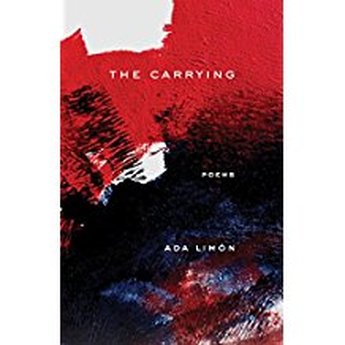 Cover art by Stacia Brady, Ada Limón’s mother. Cover art by Stacia Brady, Ada Limón’s mother. Last week I had the privilege of hearing Kentucky resident and nationally-acclaimed poet Ada Limón read from her newest collection, The Carrying. Rich Copley, writing for the Lexington, Ky., Herald-Leader, said, “The book is colored by the deep green of Kentucky….Limón’s work is marked by exquisite, minute details that pass by many people.” It is indeed a lovely book, with heart-rending personal reflections and keen observations of the world that surrounds her. After the reading—during which Limón exhibited her usual warmth and quiet exuberance—an audience member asked why she wrote so frequently about nature. I wish I had been prepared to capture her full response, but my general recollection is that she writes about nature because she has to. It defines her place in this world. The first poem in the collection, “A Name,” reminded me of my father. When Eve walked among the animals and named them-- nightingale, red-shouldered hawk, fiddler crab, fallow deer-- I wonder if she ever wanted them to speak back, looked into their wide wonderful eyes and whispered, Name me, name me. At its most elemental, the journal my father kept at The Last Resort was a means for recording the natural world around him: the birds, the trees, the wildflowers, the river level, the snakes, the peepers calling in the spring. He documented the names of each, both the common names and the scientific names, as he prepared, wittingly or unwittingly, for a future career. He understood that in order to acknowledge the intricate parts of the natural environment, it was important to be able to identify each by its name. The name itself would then call up a fulsome list of traits and characteristics—some unique, some common with other similar species—that defined that particular plant or creature. If the critters could talk, I suspect there were moments when they indeed had a name for my dad: threat, intruder, murderer. He describes a memorable moment after he has shot a young squirrel: “I can still see that tiny baby sitting hunched on that limb, chattering gleefully to himself and gnawing on a pignut. To think that I would snuff out such a happy existence. It will never happen again.” Sadly, it took being hunted by his fellow man during World War II for Pud to finally end his hunting of animals for sport. Is there perhaps a more sinister consequence of naming others who share this world with us? When Eve named the things in the garden, did she innocently guarantee their ultimate destruction? Once they became separate from the two who claimed dominion over them, once they were identified as different, were they expendable? Insignificant? Unprotected? On the other hand, it’s hard to truly see what we can’t name. During our daily rush to and fro, we pass trees and wildflowers and songbirds. If we can’t name them, we don’t see or hear them. We don’t recognize them or respect their importance. If we don’t recognize their value, we don’t feel remorse when they are destroyed. We stand by and allow their annihilation without understanding what we have lost. Part of this journey for me, as I write about my father and the words he left behind, has been learning what it means to belong to the genus Goodlett. As my cousins and I gather more regularly to honor our long-gone parents, we ponder the mysteries of our Goodlett ancestors, and we try to figure out who we are. If our name is Goodlett, what does that mean? What are our traits and characteristics? Would a dichotomous key distinguish us from the Smiths and the Joneses? Does the name carry pre-packaged notions? How do others respond to it? How do I live up to it? Or carry its burdens? How has my name defined who I am, or my ultimate fate? In Limón’s poem, Eve’s plea to be named also feels like a voicing of her desire to be part of the community she is ordering. Perhaps a name would define her place, her role, her responsibilities among the others that share her space. Perhaps once we identify ourselves, we can see more clearly how we must defend and protect all the species that inhabit this earth. For more on the importance of naming things in The Last Resort, refer to David Hoefer's blog The Power to Name.
0 Comments
Your comment will be posted after it is approved.
Leave a Reply. |
Details
Archives
June 2023
Categories
All
|


 RSS Feed
RSS Feed